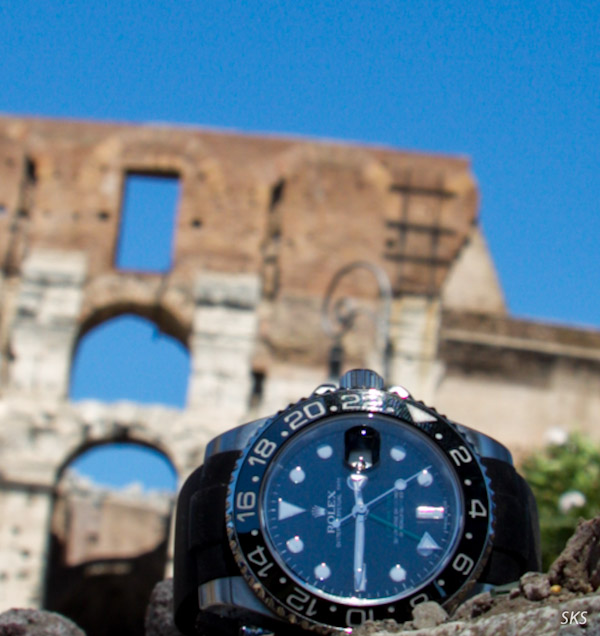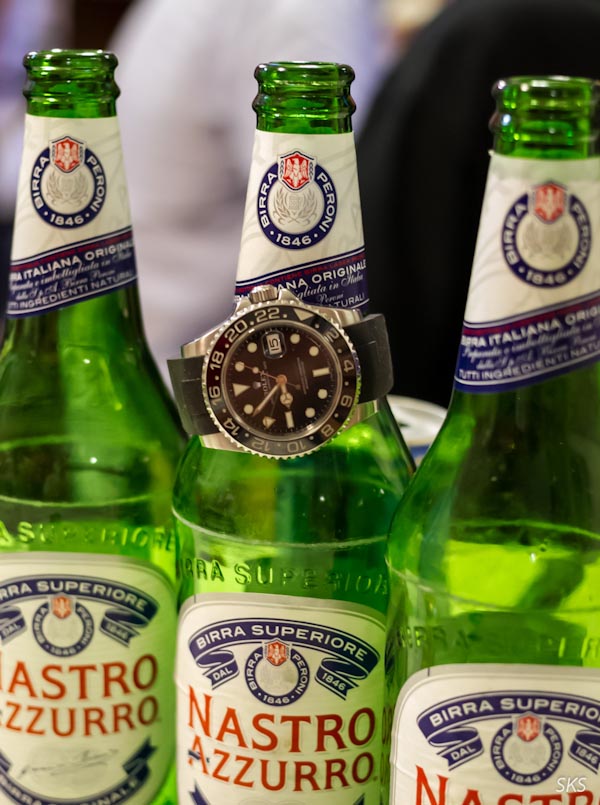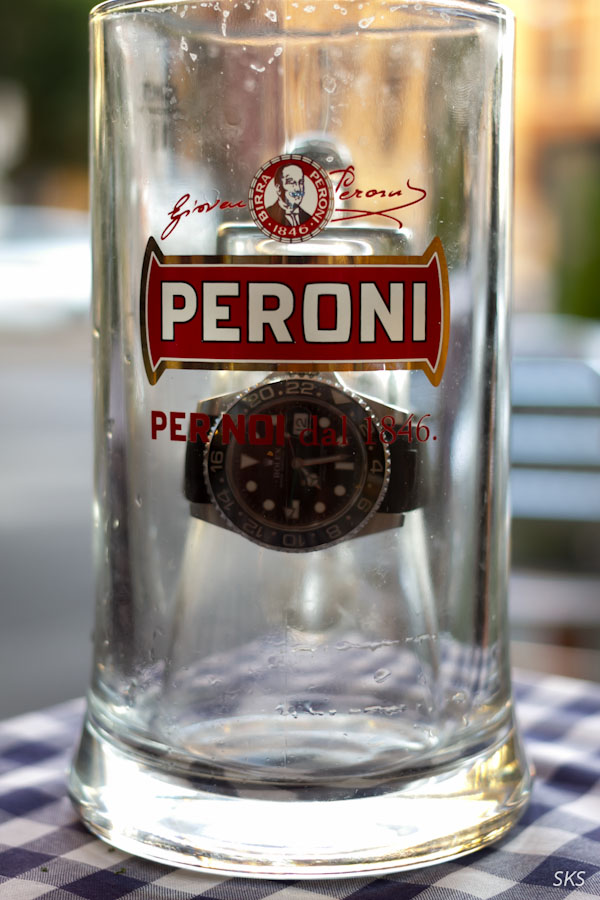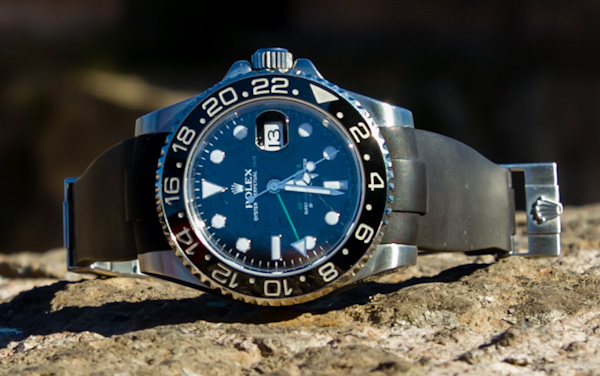 Contributed by Sheldon K. Smith
Contributed by Sheldon K. Smith
An evolving category in the watch market are replacement aftermarket products not intended to mimic the original, but rather to improve or change the way the watch looks and feels. One of those companies entering into this category is Everest Horology. On August 10th, 2012 Everest Band releases the EH-1, a medical-grade silicone strap designed specifically for Rolex sport watches including the Explorer II, Submariner, DeepSea, and GMT. Unlike most other replacement straps, the Everest EH-1 is designed to fit the Rolex watch head exactly with a fit very similar to Rolex’s original Oyster bracelet.
Everest Horology is not the first company to manufacture a replacement silicone strap for Rolex. Another company, RubberB has been producing silicone Rolex replacement straps for almost two years and it is easy to make comparisons between the two because they both have a penchant for detail and quality. Although Everest Horology and RubberB straps look similar, the Everest EH-1 Band was designed completely from scratch without attempting to mimic Rolex’s Oyster bracelet. Other than an Oyster link look at the watch head end of the strap, the Everest EH-1 Band has a different shape and slightly different profile than Rolex’s Oyster bracelet and RubberB’s strap. One notable difference between Everest’s design over the RubberB’s is that Everest’s is designed for Rolex’s Easy Link, a half-link extension that hides under Rolex’s newer Oyster clasps. Additionally, Everest Horology’s EH-1 Band is made in the United States whereas RubberB’s strap is manufactured in Switzerland.
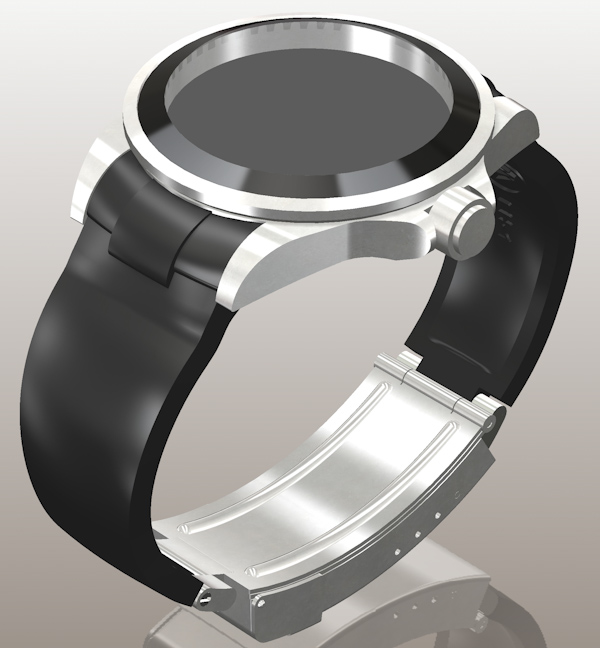
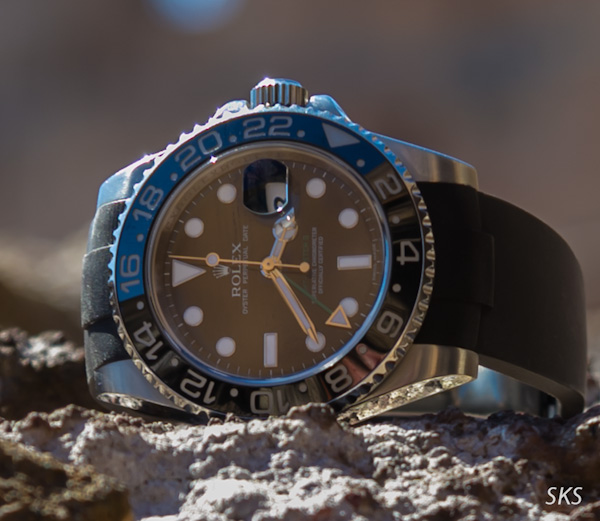
The problem with Rolex:
There are a lot of things that Rolex does right. Rolex’s sapphire crystals with the tell-tale cyclops, tractor-like movements, and patented water tight cases are what define tool watches. Despite Rolex’s numerous patents and technical achievements, there are aspects that Rolex completely misses. Night visibility and the amount of lume on a Rolex watch face and hands is always a criticism, and the “tuna-can” like clasp and bracelet links that are truly utilitarian and rarely failed, but were frequently criticized when matched with other brands. Many now-vintage Rolex watches do not have the original bracelet as that was the first item to wear out. For decades Rolex’s glacier-like design changes and staying true to being “evolutionary” rather than be “revolutionary,” leaves a classic watch open for improvements.
When it comes to making a Rolex watch “better,” there are two categories for modifications. The first are modifications that clearly mimic the original Rolex such as modified dials and bezels, typically inlaid with diamonds, or a modified color to make the watch face look like an original that fetches a premium among collectors (e.g. Paul Newman Daytona dials). The second and more legitimate category is modifications clearly designed to improve upon Rolex’s design and provide the owner options that Rolex doesn’t. Options such as different watch straps and sapphire casebacks give the Rolex owner more functionality than what the original factory model provides. Just as how AMG has manufacturer approved modifications for Mercedes Benz, and the M series subsidiary for BMW, replacement strap and caseback companies provide functionality to Rolex that the user can install, but unlike the car modification companies, can switch these modifications back to factory on a whim.
So what’s the Issue?
The Rolex Oyster bracelet is one of the most durable and recognizable bracelets found on Swiss watches. Its trademark Oyster look is recognized around the globe and variations of it are seen on other watch brands. The Oyster bracelet is durable, but for sport watches, there are instances when the bracelet needs to give or stretch a little bit, or be lighter – similar to the comfort a leather strap possesses, as well as be waterproof. Under conditions when the weather is hot and there is heavy perspiration, a strap needs to give while the wrist expands under heat. This is where having a silicone strap that is impervious to ultra-violet light or breakage comes into play, and one of the reasons why many sport watches are outfitted with a silicone strap. Lastly, for athletes, wearing a stainless strap while running or cycling typically yields, well, for the lack of a better term, black sweat gunk comprised of dirt and perspiration that builds up under stainless bracelets. This black gunk only comes off with soap and water.
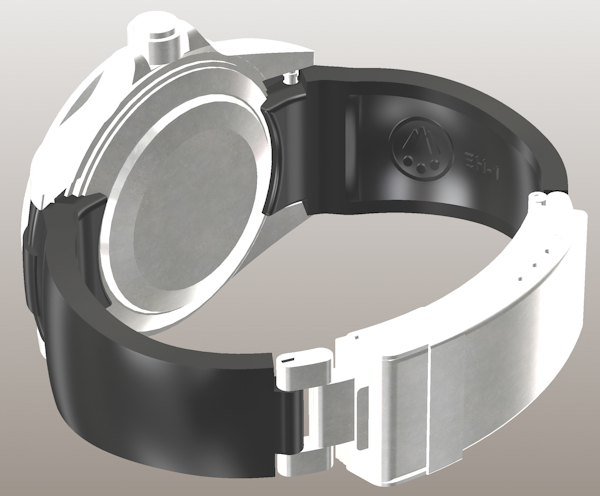
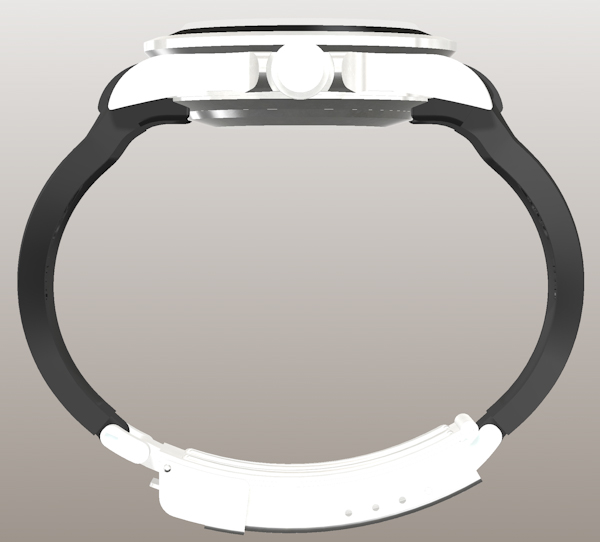
It’s not easy to make a silicone strap…
There are not many companies that produce quality silicone straps because there is more to it than what meets the eye. Both Everest Horology and RubberB shared that producing silicone straps is a tiresome effort done out of passion for Rolex and to improve the Rolex watch wearing experience. The amount of trial and error with prototypes and the amount of handiwork each strap requires makes designing and manufacturing straps a tiresome effort. Because silicone straps are not hand stitched or hand cut, most people assume that the strap pops out of a production mold, into packaging and off to the retailer. But in reality, high quality silicone straps require a clean room, are cured, cleaned, shaped/trimmed, vulcanized, and coated such that it possesses the quality and durability levels fitting for a Rolex watch. Many people associate silicone with rubber, but in reality they are entirely different. The only things that are “rubber” are items made from the material directly from a rubber tree. Everest Horology uses “medical grade silicone rubber” that is an exacting specification that exceeds FDA standards and must have zero reaction with the human body.
Everest Strap in the Wild
I wore a pre-release Everest EH-1 Band on a 10 day adventure to Rome Italy, in which the summer is one hot place with conditions that are more humid than what I experienced at the bottom of the Grand Canyon the previous summer.
Wearability
One of the noticeable aspects of the Everest EH-1 Band is that it stretches slightly and has a somewhat spongy feel. Despite the sponginess, the strap is made of medical-grade silicone and is vulcanized like all other rubber straps found on quality Swiss watches. Additionally, the Everest EH-1 Band has two coatings; one that is a surface finish and another that is an anti-microbial coating. Unlike the RubberB strap which does not stretch much, the Everest EH-1 Band rubber gives/stretches slightly when there is tension on the strap which is great on hot days when wrists swell. Also, the silicone used in the Everest EH-1 Band is formulated to look new years down the road, and is impervious to heat. With the RubberB strap, I gently heated it with a stove lighter to make it conform around my wrist as the RubberB strap feels stiffer than Everest’s. In doing the same procedure with the Everest EH-1 Band, it sprung back to its original flat shape. In Italy, I discovered that the springiness was an advantage as the heat would expand and contract my wrist size and the strap would just accommodate changes in wrist size.
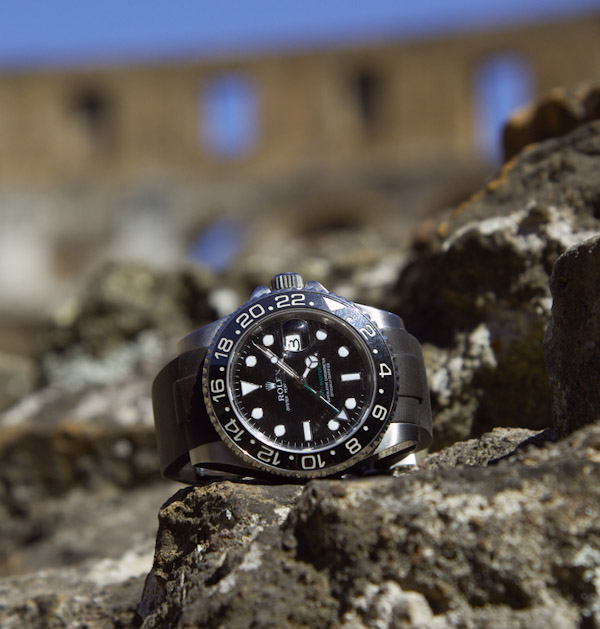
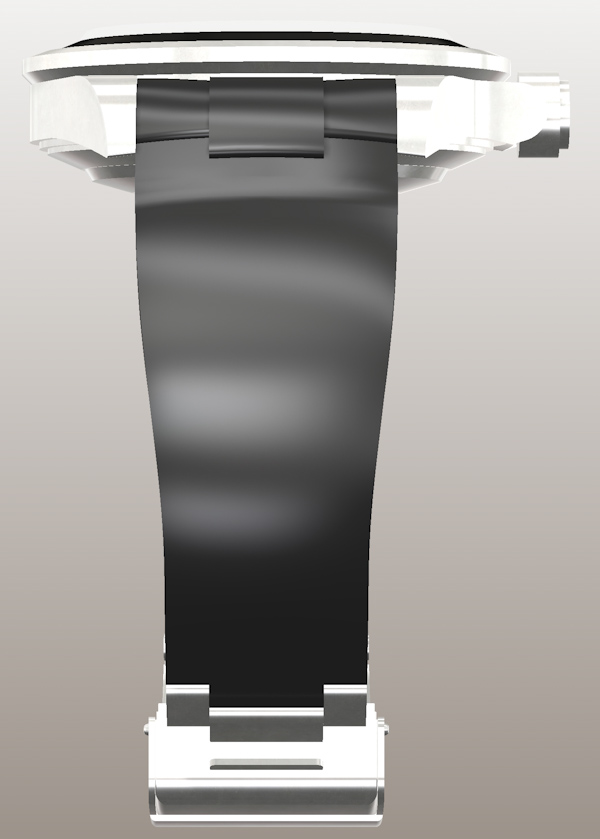
Looks:
The Everest EH-1 Band black strap color compliments the gloss black face of my GMT-C and the black Ceracrom bezel. After a 10 days of wearing it, a little rubber strap cleaner from Veraet (http://www.veraet.com/collections/watch-care/products/watch-band-rubber-and-leather-care) made the Everest EH-1 Band strap a little darker and appear newer. Over time, the RubberB strap developed a little patina which was exacerbated by Veraet use, but the Everest EH-1 Band went back to looking new. It’s obvious that RubberB and Everest Horology utilize two completely different types of silicone.
Others noticed the Everest EH-1 Band while wandering around Rome. On one occasion while riding a Vespa, another Vespa driver was caught eye-balling the strap when we were all lined up at stop lights, and there were inquiries by Rolex dealers I visited, on the source of the strap.
Installation and Fit
Everest Horology’s EH-1 installs similarly to any other Rolex Oyster bracelet because the section of the strap that fits between the watch lugs is designed to be a precision fit with the watch head. Because there is more space for a springbar tool, installing an Everest EH-1 Band is actually easier than installing a Rolex Oyster bracelet. For Rolex wearers accustomed to removing the bracelet for occasional cleaning, installing the Everest strap is a breeze. (A tutorial on removing Rolex straps can be found at http://www.minus4plus6.com/maintenance.htm#removal). Everest’s EH-1 is designed to replace 4.5 Oyster links on a Rolex bracelet and is fitted utilizing the existing adjustments in the Rolex clasp. Everest Horology found that 4.5 Oyster links fit the majority of Rolex wearers while keeping the clasp centered on the wrist. If the strap is too short an existing Oyster link can be used to lengthen one side of the bracelet.
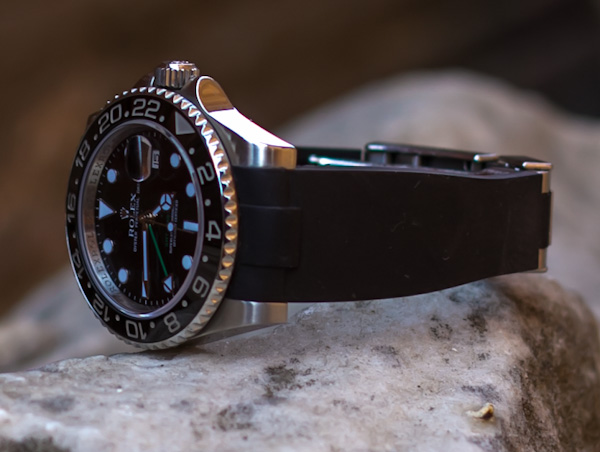
What’s Next for Everest Straps
Everest Horology will be releasing the Everest EH-1 Band in limited quantities soon. The Everest EH-1 Band is designed to fit the Submariner because they are more prevalent, but will fit the Daytona, GMT (16710), GMT-C (116710), the Explorer II (16750), and Explorer I 39mm. Mid-September should bring an orange colored version, followed by LV green and military blue in mid-October. Everest Horology is also developing a strap with an integrated buckle, as well as one for the DeepSea SeaDweller that will work with the ultra-cool DSSD Glidelock clasp. You can pre-order yourself here by supporting the Everest strap project on Kickstarter until it is over soon.
Additionally, when Everest drops the Everest EH-1 Band, they will host a product forum/focus group on TimeKeeper Forums for wearers to provide feedback back to the company and for Everest to ask questions of EH-1 wearers.
The experience with the Everest EH-1 Band was positive and I will continue to use the strap for my next travel and sporting adventures. Rolex should offer quality silicone straps for their sport watches, but with a company like Everest, there is no need. The advantages of Everest Horology’s EH-1 are that it conforms to the wrist well, the clasp stays centered on the wrist, utilizes the existing Rolex clasp and Easy Link, and $185 (US) for a quality silicone strap made entirely in the United States is quite reasonable.
Sheldon K. Smith is a longtime watch enthusiast who runs Minus4Plus6.com, a website dedicated to horological experiences and information. Sheldon is a contributor to International Watch Magazine and various watch blogs. An educator by training, Sheldon holds degrees from California Polytechnic State University – SLO, and a doctorate from the University of Southern California. He is currently an assistant superintendent in a 9500 student California school district.
